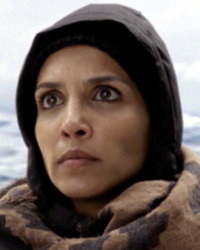
Farah Nazan, NBC’s Heroes Reborn. Source
This post was written by guest contributor Heba Elsherief (@iamsheba).
“Full stories are as rare as honesty.”
― Zadie Smith, White Teeth
When, in a recent episode of NBC’s Heroes Reborn, a prayer mat appears atop an expansive and pristine Arctic landscape, my pulse quickened. A woman could be seen completing the prayer, Dhuhr or Asr if one considers the brightness of the day, and because the TV medium (indeed, like many narrative forms) encourages audiences to give into the “suspension of disbelief,” I let myself get transported in the moment. The shot is breathtaking: white snow for as far as the eye can see, nothing but a red, richly ornate prayer mat, this spiritual woman, and the unseen Lord she prays too. It’s a beautiful scene, holding the promise of something I’d never really seen on television: a Muslim woman superhero. I was excited to learn more about this character and what nuance she’d bring to the show, but I was also dreading the fact that she might perpetuate negative stereotypes. Would she do for TV what Ms. Marvel has done for comic books? Or would she embody the type of overtly negative (and, frankly, ignorant) prejudices about Muslim women that shows like Homeland regularly do?
Viewers learn that the superhero’s name is Farah. She’s been charged with protecting and mentoring the young Malina, who we’re told, is meant to save the world from the as yet unspecified entity that threatens to destroy it. Farah is tough and nurturing; wise and brave. Despite her impetuosity, young Malina is quick to accept her as a mother-like figure. As a Muslim viewer, I let out a sigh of relief. I’m pleased that the representation of Farah isn’t overtly negative, but something nags at me still. I can’t immediately put my finger on it and think that maybe it has to do with the fact that Farah is the “mother” figure, a topos that lends itself to essentialism. Then I rationalize that Muslim women aren’t really ever represented much at all, so the mother trope might not be a bad thing. Furthermore, if nothing else, Regina King’s portrayal of a Muslim sister struggling to help her brother on American Crime began a conversation on the representation of Muslim women on TV. So, I turn to Farah’s superpower and find my answer. Farah’s power is invisibility. A Muslim woman with the power of invisibility! Notwithstanding that invisibility is a word one might use to describe those burka-clad women who aren’t Clair Danes in red on the promotional poster for Homeland, let us unpack what that might mean in relation to superpowers.
Certainly, in recalling Harry Potter’s invisibility cloak, this seems like a really cool thing – and maybe I should just be grateful that it Heroes Reborn isn’t perpetuating a harmful stereotype. By stereotype, I speak of the generalized, essentialized, and often offensive idea that Muslim women occupy a place of invisibility in their communities. Invisibility is the state of being unseen and when Farah uses it on the show, she is either running from enemies or snuffing out threats in order to keep Malina safe. Still, why invisibility for Farah? Why not flight, for instance? Surely, Farah could undertake her task through flight. In a May 2015 rebroadcast of a popular 2001 episode, the podcast This American Life, the debate between the two types of superpowers prompted discussions online and a behavioural statistician at Forbes presented data that showed that global leaders overwhelmingly choose flight (72%) compared to invisibility. The implication was that choosing invisibility likely meant that respondents were “less confident, less powerful, or less in control.”
The challenge for media modes who truly seek to portray the female Muslim experience (superhero or otherwise) is to offer opportunities, a chance for characters to show the public who they more “fully” are. While it isn’t immediately clear whether or not Heroes Reborn hired Muslim women writers and/or advisors, I think that the practice should be encouraged. Listening to our nuanced experiences instead of depending on constructs or ideas projected through proxy voices is a good way to begin having serious conversations about Muslim women on TV, but it would seem that producers aren’t entirely ready have this happen. In the episode “the Lion’s Den” of Heroes Reborn, we see a dying Farah urging Malina to run as she distracts their pursuers and handing the would-be world saviour an envelope she needs in order to complete her task. Farah has sacrificed herself, a noble enough act for any hero befitting of the title; but, because we will not be able to learn more about her complexities (as we will undoubtedly do with the more “mainstream” characters), it is also a convenient one.
